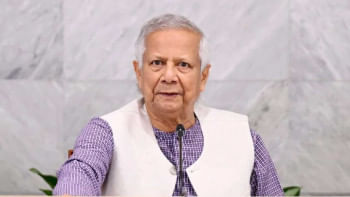Beware of fake notes
With Eid-ul-Fitr round the corner, counterfeiters are churning out fake notes and releasing them in the market.
Circulation of fake notes has widened despite efforts from law enforcement agencies to stop the illegal business.
“This is the perfect time for counterfeiters to release fake notes in the market,” said Commander Mohammad Sohail, director of legal and media wing of Rapid Action Battalion.
Rab has already seized fake notes of several lakh taka and arrested about ten people since the start of Ramadan on August 2.
Law enforcement agencies have found involvement of international racketeers in the murky business.
“Some foreigners, especially Africans, Filipinos, Pakistanis and Thais are involved in the illegal business,” said Sohail referring to a Rab report.
Many of these foreigners live in Bangladesh with expired visas and some of them rented houses at Uttara in the capital, he said.
The country's banks are now more cautious with the increased risk of fake currencies this year.
“I get two to three fake notes at the counter every day. It seems the circulation of fake notes has gone up ahead of Eid,” said a cashier at a private bank at Motijheel, the commercial hub of the capital.
Circulation of forged notes happens round the year. But it reaches the peak during the two Eids when people spend a lot of money on shopping.
A national committee is there to deal with the menace but it seems to have hardly any impact on the situation.
Forged notes are detected at many places -- from automated teller machine (ATM) booths to shops and banks. Those who happen to get fake notes often become the loser because of the faulty laws.
According to law enforcement agencies, production and supply of counterfeit notes have become an easy business that requires smaller investment.
“A computer, a colour printer, some particular paper and chemicals are enough to do the illegal business,” said Commander Sohail.
Notes of Tk 100, Tk 500 and Tk 1,000 denomination are being forged.
According to bankers and Rab, counterfeiters make fake notes mostly of Tk 500 denomination. A Tk 100 note (almost equal in size to Tk 500 note) is often rubbed off by chemicals to turn it into a Tk 500 note.
Most counterfeit notes look very similar to the real ones, making it difficult for a layperson to figure out the difference.
Thirty-five-year-old Mahbub Molla, arrested by Rab on August 17 with links to note forgery, said they sell fake notes of Tk 100,000 for Tk 20,000 to racketeers, who sell those to other parties.
Salehuddin Ahmed, former governor of Bangladesh Bank, pointed to the loopholes in the laws and the trial system as the main reasons for the growing menace.
“Culprits are not given exemplary punishment. They often get bail from the court and resume the illegal business,” said Salehuddin.
Laws should be amended because they hold responsible the person who has fake notes in possession, he said.
During his stint as the central bank governor, some special cases of note forgery were sent to the home ministry, but Salehuddin still doesn't know about their fate.
He said widespread circulation of fake notes leads to illegal activities and boosts black economy.
Jahangir Alam, executive director of Bangladesh Bank, said a national committee is there to deal with the problem of fake currency notes.
“As the central bank we sensitise banks and people to forged notes,” he said.

 For all latest news, follow The Daily Star's Google News channel.
For all latest news, follow The Daily Star's Google News channel. 



Comments